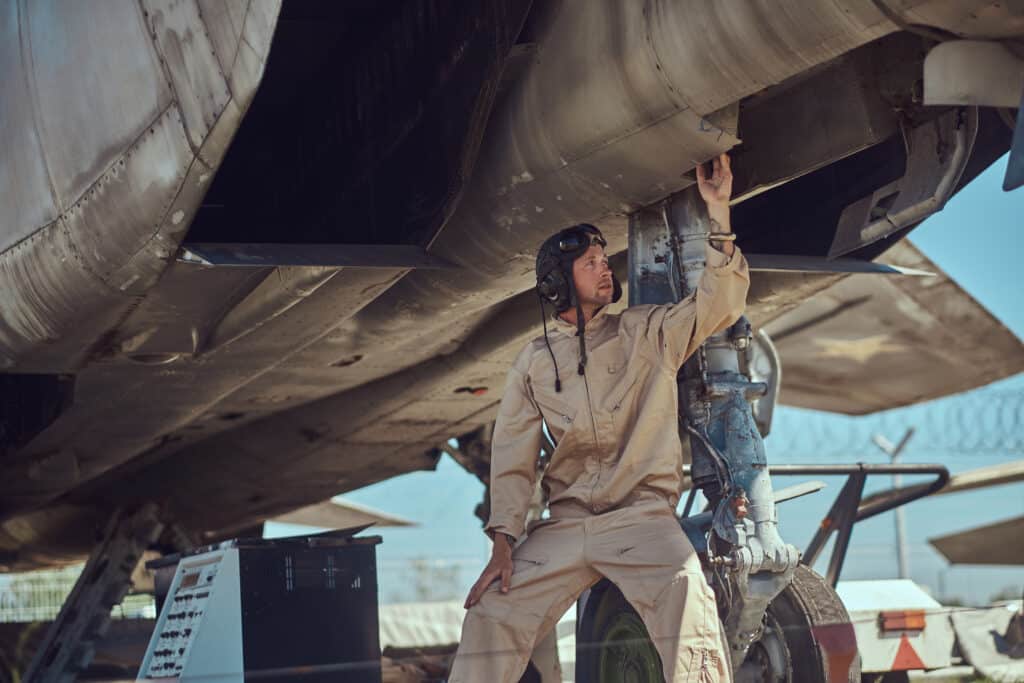Mesothelioma Veterans
The U.S. Armed Forces have historically relied on products and equipment made with asbestos during most of the 20th century, unbeknownst to the harmful effects of the mineral. This exposure affected both military personnel and citizens. Approximately 30% of all mesothelioma cases consist of military veterans. If you or a loved one has been diagnosed with mesothelioma, contact the Lanier Law Firm today for a free consultation.
Home » National Mesothelioma Law Firm » Veterans

Legally Reviewed By: Jonathan Armour
Senior Attorney, Asbestos Exposure
- Page Last Updated:
- December 23, 2024
We now know significant numbers of American troops survived combat only to succumb to a more insidious enemy on their own turf. The enemy is asbestos, a product that causes the rare and deadly cancer known as mesothelioma. Its onslaught continues today.
Although asbestos was widely used in multiple commercial applications, exposing both civilians and military personnel, veterans have been disproportionately impacted. Military veterans comprise 7% of the U.S. population, but they account for 30% of mesothelioma cases.
Asbestos Exposure in the Military
Veterans across all branches of the military were at risk of asbestos exposure during their service. This is because asbestos was widely used in ships, vehicles, aircraft, and even buildings on military bases. Inhaling asbestos fibers, which could happen when these materials were damaged or disturbed, can lead to serious health problems later in life, including lung disease and mesothelioma.

Air Force
The U.S. Air Force extensively used asbestos throughout its facilities and equipment due to its affordability and fire-resistant properties. This meant asbestos was present in brakes, insulation, adhesives, and even building materials on bases. As a result, Air Force personnel faced a high risk of exposure. Anyone who worked around aircraft, in buildings, or with mechanical parts during their service could have inhaled asbestos fibers.
Army
Army barracks, intended for soldier safety and rest, often harbored a hidden danger: asbestos. Many barracks across the United States and overseas were made from the 1930s to around 1980, when asbestos was popular in building construction.
Army soldiers across various specialties faced further asbestos exposure during their service. Administrative workers breathed in asbestos fibers from aging buildings, while construction workers directly used asbestos materials. Sadly, overseas deployments continue to face this risk, as some countries lack asbestos restrictions.


Coast Guard
Coast Guard personnel faced significant asbestos exposure throughout the 20th century, particularly during World War II. Asbestos’s insulating properties made it widely used in shipbuilding and maintenance for applications like boilers, pipes, and living space bulkheads. This danger wasn’t limited to serving at sea. The Coast Guard’s shipyard at Curtis Bay, Maryland, built and repaired ships with substantial asbestos use from 1940 to 1975. While asbestos use ended after 1990, many pre-1991 cutters remain in service, putting personnel at risk from lingering asbestos materials.
Marines
Marines encountered asbestos extensively during their service, both in buildings and on aircraft. Military bases constructed before the late 1970s likely contain friable asbestos in building materials like flooring, insulation, and ceilings.
Exposure wasn’t limited to ground duty, as marine aircraft mechanics directly handled asbestos components like brakes and gaskets due to the material’s heat resistance. The risk persists today, as asbestos remains in many buildings and equipment despite efforts to remove it. Active duty Marines deployed overseas may also face exposure from asbestos still present in foreign buildings and infrastructure.


Navy
Decades of heavy asbestos use on Navy ships and in shipyards put sailors at high risk of exposure. Asbestos was practically everywhere on a Navy ship, from plumbing to the hull itself. Routine wear and tear from constant motion at sea released asbestos fibers into the air, especially during maintenance tasks.
Shipyard workers faced even greater exposure, directly handling asbestos during construction, repairs, and removal processes. These jobs often resulted in significant “bystander exposure” for nearby workers as well. The risk wasn’t limited to peacetime; during World War II, the Navy stockpiled asbestos for shipbuilding and even used it in protective gear.
Veterans Compensation Options for Mesothelioma
Veterans with mesothelioma, an asbestos-related cancer, have several options for compensation. They can file claims with asbestos trust funds set up by bankrupt companies, sue the companies responsible for their exposure, or apply for VA benefits due to their service-connected illness.
Asbestos Trust Funds
Asbestos trust funds were established by companies that manufactured or sold asbestos products and later filed for bankruptcy. The funds are intended to compensate victims of asbestos exposure, including veterans who may have been exposed during their military service.
There are specific criteria for eligibility, but veterans who can demonstrate asbestos exposure while on duty and a subsequent diagnosis of mesothelioma may qualify for compensation from these trust funds. Compensation can cover medical expenses, lost wages, and even pain and suffering.
An advantage of trust funds is the streamlined claims process compared to lawsuits. Our knowledgable asbestos exposure attorneys can assist you in navigating the trust fund claims process and ensure you get the compensation you’re entitled to receive.
Mesothelioma Lawsuits
As a veteran, your service may have put you at risk of asbestos exposure during your military duties, leading a mesothelioma diagnosis. The legal system offers options to help you recover compensation for the high costs of mesothelioma treatment, lost wages, and pain and suffering. Filing a mesothelioma lawsuit can not only provide financial security for you and your family, but also hold accountable the companies responsible for your exposure.
Our experienced mesothelioma attorneys can determine your eligibility for a lawsuit. If you have mesothelioma and can establish where your asbestos exposure occurred, or if you are the close friend or family member of a loved one who passed away from an asbestos-related illness, we can help. We’ll work diligently to investigate the source of your exposure and gather evidence to build a strong case on your behalf.
VA Benefits
If you’re a veteran with mesothelioma or suspect asbestos exposure during your service, the VA offers comprehensive benefits to help:
- Monthly disability compensation: Tax-free payments for veterans with service-connected disabilities like mesothelioma.
- Pensions: Financial support for veterans with limited income and resources.
- Healthcare: Free medical treatment for veterans with qualifying conditions, including mesothelioma.
- Survivors benefits: Financial assistance for families when veterans die from asbestos-related illnesses.

Our dedicated mesothelioma lawyers can help navigate the VA claims process and ensure you receive all the benefits you deserve. They can also advise you on your eligibility and assist with filing your claim.
Who Qualifies for VA Benefits?
VA pensions may be provided to veterans with limited income who served at least one day during wartime. This benefit doesn’t require a service-connected disability. The VA also offers Aid & Attendance, which provides additional financial support to veterans or widows receiving pensions who need help with daily living activities. Eligibility for both pensions and Aid & Attendance depends on factors like income, net worth, and wartime service.
Further benefits may include Dependency and Indemnity Compensation (DIC), which is a tax-free benefit that supports surviving spouses and children of veterans who died from a service-connected asbestos illness. The veteran must have been diagnosed before death and exposed to asbestos while serving.
There are also VA benefits outside of monthly compensation paid directly to the veteran or family member(s). CHAMPVA is a health insurance program that helps cover medical expenses for certain family members. You may qualify if you’re the spouse or child of a veteran permanently disabled or deceased due to a service-connected asbestos-related illness. Further, there are programs to assist caregivers for veterans enrolled in VA healthcare who need help with daily living activities.
It is important to note that this overview of options is not comprehensive. Please consult with one of our asbestos attorneys to further understand the VA benefits you may be entitled to receive.
Learn More About
Filing a Mesothelioma Lawsuit
- Are you eligible?
- What is the average settlement?
- How long will it take?
Why Should You Trust the Lanier Law Firm to Handle your Mesothelioma Case?
Where Was Asbestos Used in the Military?
Military service inherently involves a degree of risk. However, for many veterans, exposure to asbestos during their service added an invisible threat to their health. Asbestos, a known carcinogen, was widely used in military applications until the late 1970s, and its presence continues to be a concern in some older facilities.
Army soldiers stationed in barracks built before 1975 were at risk of exposure to asbestos because construction materials frequently contained the hazardous substance. The danger extended to soldiers deployed overseas, who faced the additional risk of exposure from damaged structures or those constructed with readily available asbestos-containing materials. Furthermore, demolitions and explosions could release large quantities of asbestos fibers if these structures contained the material.
Sailors aboard Navy vessels faced significant risk of asbestos exposure throughout their service due to the extensive use of asbestos for insulation and fireproofing. Asbestos was used in everything from plumbing fixtures and adhesives to bulkheads and the ship’s hull itself. The Navy’s use of asbestos dates back to the 1880s, and some older ships may still contain the material.
Similar to the Army, Air Force bases utilized asbestos in building construction, potentially exposing personnel stationed there. Asbestos was valued for its heat resistance and lightweight, making it a common choice for aircraft parts that generated significant heat, such as engines, or experienced friction, like brakes.
Coast Guard cutters built prior to 1991 likely contain asbestos, reflecting its widespread use in shipbuilding during World War II. The Coast Guard played a vital role during the war, and asbestos’s waterproofing and insulating qualities made it ideal for various shipbuilding and maintenance applications. This included insulation, pipes, boilers, and bulkheads in living spaces, as well as components throughout the ship. Those serving aboard ships were potentially exposed 24/7.

Marine Corps bases heavily relied on asbestos for construction, potentially exposing Marines in housing, schools, and workplaces. An inspection conducted as recently as 2004 revealed the presence of friable asbestos – the most concerning form as it can easily crumble and release harmful fibers – in several housing areas on a Marine Corps base. This highlights the ongoing risk posed by asbestos in older buildings. Marine Corps air stations also utilized asbestos in their construction, and Marines working on aircraft faced significant exposure due to the presence of asbestos in brakes, gaskets, and other aircraft components. Aircraft brake linings, for instance, could contain a substantial percentage of asbestos by weight.
The extensive use of asbestos in military installations has created a long-term health risk for veterans. Asbestos exposure can lead to serious health problems, including mesothelioma, lung cancer, and asbestosis. These illnesses often take decades to develop, making it challenging to connect them to military service.
If you or a loved one is a veteran who is concerned about potential asbestos exposure during their service, contact our team of highly experienced asbestos lawyers. We will work to help identify your exact sources of exposure and take the necessary legal matters to obtain compensation on your behalf.
Military Jobs at Risk of Asbestos Exposure
Extensive use of asbestos within the U.S. Armed Forces between the 1930s and the late 1970s presents a potential health risk for veterans who served during this period. Asbestos was incorporated into various military applications due to its desirable properties like affordability, durability, and heat resistance.
The following military occupations carry a high likelihood of asbestos exposure:
- Aircraft mechanics
- Carpenters
- Construction workers
- Engine mechanics
- Firefighters
- Machinists
- Maintenance workers
- Metalworkers
- Plumbers
- Ship builders
- Shipyard workers
This list is not exhaustive. Veterans who served during the aforementioned timeframe should be aware of the potential for asbestos exposure, regardless of specific occupation. If you have concerns about potential exposure during your military service, consulting a healthcare professional and asbestos exposure attorney is crucial to understanding your individual risks and exploring available resources.
Veterans Mesothelioma FAQs
Is mesothelioma a VA disability?
Yes, mesothelioma is a 100% disabling condition for the VA. This means veterans diagnosed with mesothelioma qualify for the highest level of VA disability compensation. Even if you served years ago, the VA recognizes the link between military service and asbestos exposure, which can cause mesothelioma decades later.
How do you prove asbestos exposure in the military?
Proving military asbestos exposure for VA disability benefits can involve multiple documents, including military discharge papers, medical and service records, and buddy statements. The VA will consider all this evidence, and while there may not be a single “proof” of exposure, a comprehensive picture can increase your claim’s success. An asbestos attorney can guide you through the process, investigate sources of exposure, and help gather necessary documents.
Can you sue the military for asbestos exposure?
You cannot directly sue the military for asbestos exposure. While legal action against the military itself isn’t an option, there are avenues that can provide financial support and resources during this challenging time. An asbestos exposure lawyer can help determine the best option for compensation, including pursuing a mesothelioma lawsuit, receiving awards from asbestos trust funds, or claiming VA disability benefits.
Where was asbestos used in the military?
Decades ago, military ships, bases, vehicles, and aircraft were built with asbestos. This fire-resistant and insulating material was used in everything from boilers and pipes on Navy ships to brake linings in tanks and insulation in barracks. Even mechanics working on aircraft risked exposure to asbestos in parts like brakes and gaskets.

What mesothelioma veterans benefits are available?
If you’re a veteran diagnosed with mesothelioma, the VA offers comprehensive support. You’re eligible for the highest tier of VA disability benefits, meaning tax-free monthly payments to help manage medical and living expenses. In addition to compensation, the VA healthcare systems provides free medical care for veterans with service-connected mesothelioma. This includes treatment, medication, and supportive care. Depending on your situation, you may qualify for additional VA benefits like pensions, aid and attendance, or caregiver support. Contact a mesothelioma lawyer to help you explore all available options.
How much does it cost to file a military asbestos lawsuit?
There are no upfront costs to you in filing a military asbestos lawsuit. We cover all costs of the case, including evidence gathering, trial fees, travel expenses, and more. We want to ensure you are focused on your health and well-being while we handle all legal aspects of your case. If your claim isn’t successful, you don’t owe us any fees. Should you receive compensation, we collect a percentage of your award or settlement.
Our Experienced Veterans Mesothelioma Attorneys
If you’re a veteran facing mesothelioma, the Lanier Law Firm understands the unique challenges you face. We have over 30 years of experience specifically helping veterans win compensation for asbestos exposure during their service.
Why Choose Us?
- Proven Track Record: We’ve secured billions of dollars in compensation for veterans with mesothelioma, including a $3.7 million award for a Navy veteran.
- Compassionate Care: We understand the physical and emotional toll of mesothelioma. Our team offers personalized attention and will fight for the maximum compensation you deserve.
- Expertise in Military Asbestos Exposure: We know the locations and types of asbestos exposure commonly faced by veterans.
Our mesothelioma lawyers have a deep understanding on VA disability benefits and asbestos trust funds. We provide our services at no upfront cost to you, and you won’t pay a dime unless we win your case. Contact us today for a free consultation and learn how we can help you get the compensation and support you deserve.
By submitting this form, you agree to our terms & conditions. Please read full disclaimer here.







